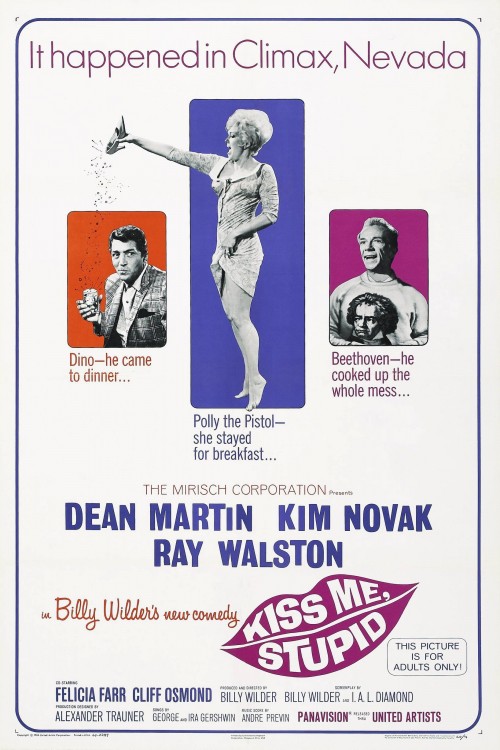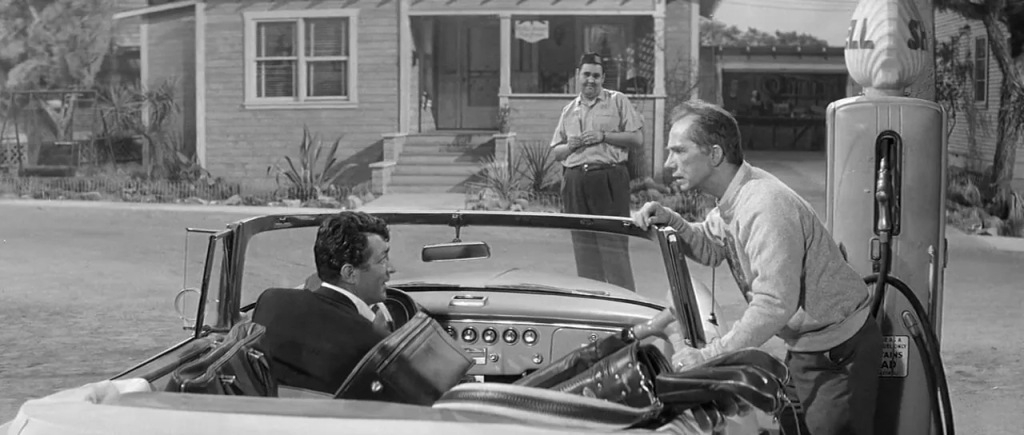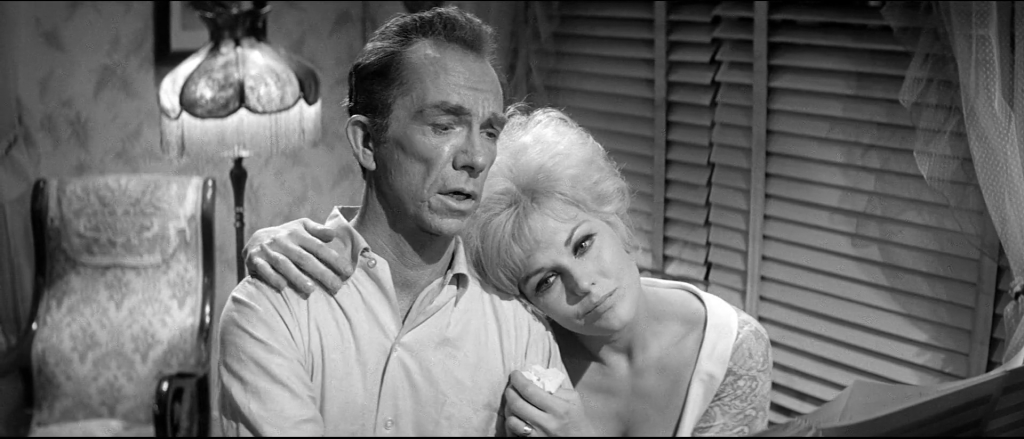by James Wallace Harris, 11/28/23
Billy Wilder has made many great movies, including seven films on the National Film Registry. So last night, when Susan and I started watching Kiss Me, Stupid (1964) we expected another hit. The show wasn’t a total dud, but it was one of the weirdest major motion pictures I’ve ever seen. It’s a sex comedy, and Wilder has a great reputation from two previous classic sex comedies, The Seven Year Itch (1955) and Some Like it Hot (1959). And if you think about it, Some Like It Hot is a very weird picture, but it worked despite its weirdness, and it gets more famous every year. Why hasn’t Kiss Me, Stupid? (Although, it might work with younger people for reasons I can’t fathom.)
There are many parallels between the careers of Billy Wilder and Alfred Hitchcock. One is young people are getting into the films of both directors today. And two, both directors fizzled out in the 1960s after a long career. There are other parallels, but for now I feel disappointed for Kiss Me, Stupid in a similar way I felt let down by Hitchcock’s Marnie, another 1964 film. Both films had many elements I liked, but they weren’t easy to watch. Both were too long.
To me, Wilder was obviously trying to have another sex comedy hit like Some Like It Hot because he originally hoped it would star Jack Lemmon and Marilyn Monroe. Both starred in that movie. Instead, he got Ray Walston and Kim Novak.
The story is about a piano teacher named Orville Spooner (Ray Walton) and gas station attendant Barney Millsap (Cliff Osmond) who dream of selling hit songs. They’ve composed 62 so far. So when Dino (Dean Martin) shows up at Barney’s gas station Barney quickly concocts a wild idea to get Dino to hear their songs. Barney sabotages Dino’s car and tells him he’ll have to stay over night. Dino asks where some action could be had, meaning where he could get laid. He tells both Barney and Orville that he gets terrible headaches if he doesn’t get sex once a day. Barney tells him to go to a dive called The Belly Button.
Dino then asks where’s a good place to stay and Barney says there isn’t any, but he should stay with Orville and his wife. When Barney gets the chance he tells Orville his plan. He wants Orville to get his wife out of the house, and they’d get a prostitute from The Belly Button to play Orville’s wife and seduce Dino. He’ll be so grateful for all their efforts he will sing one of their songs on his TV show.
Orville’s wife, Zelda, is played by Felicia Farr, who was Jack Lemmon’s wife at the time. The prostitute, Polly the Pistol is played by Kim Novak. And here’s one of the major problems of Kiss Me, Stupid. Even though Ray Walston does a good job playing Orville, the loser piano teacher, who is easily sent into rages of jealousy over his pretty wife, there’s no chemistry between him and Farr, or him and Novak. And Walston plays the role just how I imagined Jack Lemmon would have played it, he just doesn’t have the physical presence of Lemmon. Lemmon really would have been the perfect choice for the role or Orville.
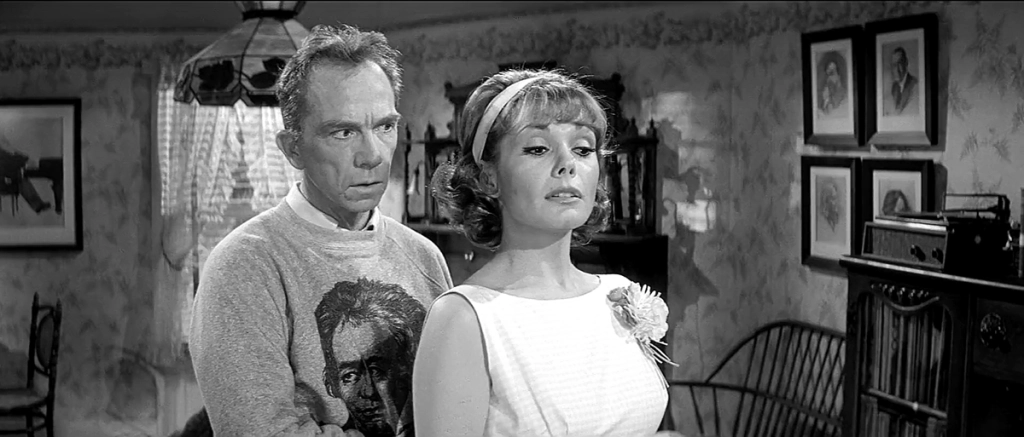
Farr plays Zelda okay, but she doesn’t really charm us. I wondered if Zelda had been played by Shirley MacLaine, who had tremendous screen charm back then, could Kiss Me, Stupid have been another Billy Wilder classic. It makes you think about just how important the actor is in a hit, especially two actors in a romantic comedy. Lemmon and MacLaine had proven themselves in two other Wilder pictures, The Apartment (1960) and Irma la Douce (1963), although the second picture is no where near as good as the first. That shows that story counts for a lot too.
And since Kiss Me, Stupid becomes a three-way love story, the role of Polly the Pistol is also important. If Marilyn Monroe had lived, I don’t think she would have been right for the part. I thought Novak did a great job, and I think if she had the right onscreen chemistry with Jack Lemmon, it would have been perfect. Poor Ray Walston just wasn’t a romantic comedy lead. And even though he’s the main character, he only got third billing.
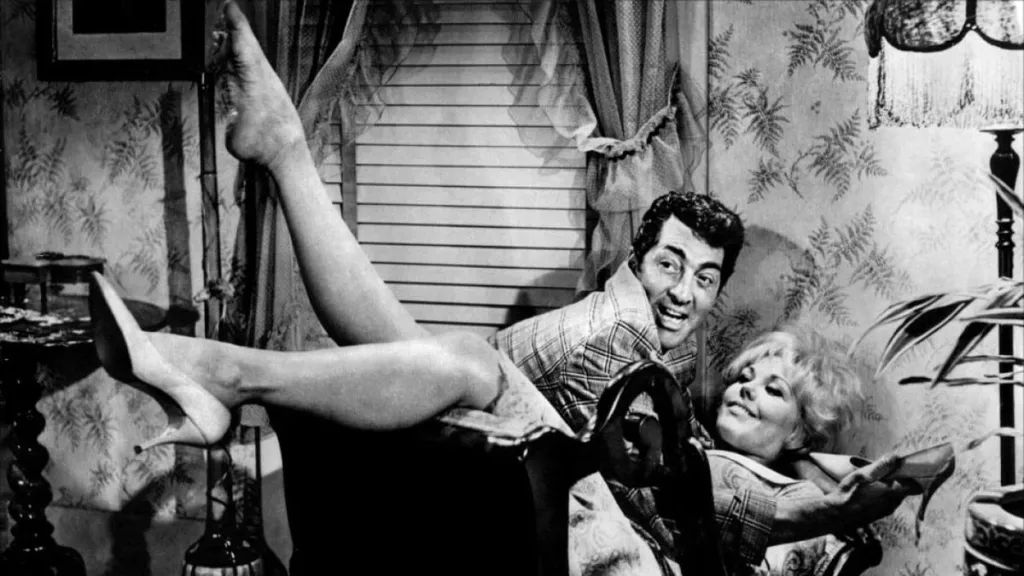
Dean Martin was fine playing himself, and his public persona that he uses in his acts fits the part, however, I always thought Martin was nicer than than the boozie character he created. And Martin never comes across as a horndog that the role needs. I wonder if Frank Sinatra or Bobby Darin wouldn’t have been better at acting the sex maniac. The part needed a big name singer who could act sleazy.
And last, I thought Barney should have been played by Jonathan Winters.
How much does on screen chemistry play in creating a hit movie? Watching Kiss Me, Stupid, it proves that it’s a great deal.
Kiss Me, Stupid was both stupid and boring in many places, but also oddly touching sometimes, and even funny in other places. We have to listen to a bunch of bad songs that are parodies of famous songs. They were funny sometimes, and painful at other times. The songs were written by Ira Gershwin pattern on George Gershwin’s melodies. They almost sound good, even the words, but it’s obvious they’re suppose to be bad too, even though they almost sound good.
Kiss Me, Stupid is available to watch for free on YouTube.
JWH

